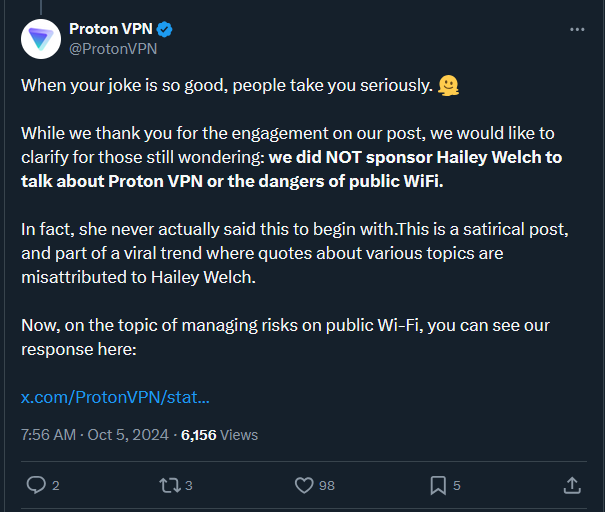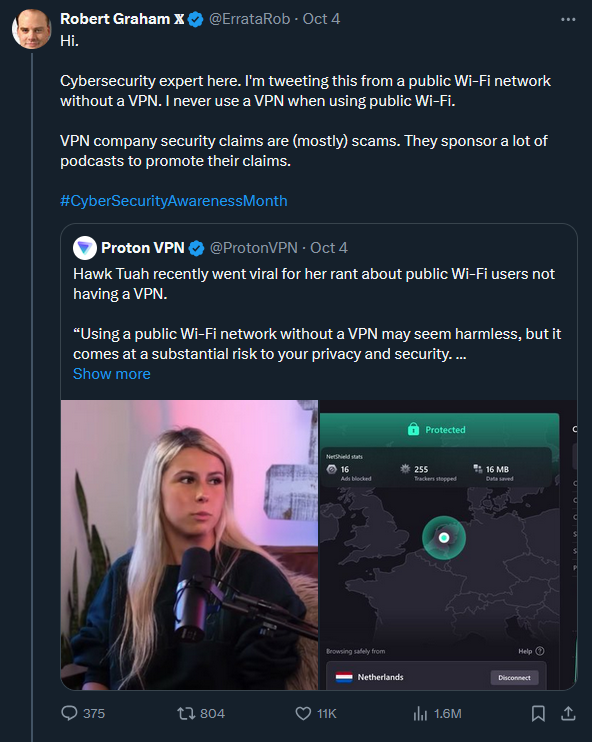this post was submitted on 06 Oct 2024
735 points (90.8% liked)
Technology
59534 readers
3143 users here now
This is a most excellent place for technology news and articles.
Our Rules
- Follow the lemmy.world rules.
- Only tech related content.
- Be excellent to each another!
- Mod approved content bots can post up to 10 articles per day.
- Threads asking for personal tech support may be deleted.
- Politics threads may be removed.
- No memes allowed as posts, OK to post as comments.
- Only approved bots from the list below, to ask if your bot can be added please contact us.
- Check for duplicates before posting, duplicates may be removed
Approved Bots
founded 1 year ago
MODERATORS
you are viewing a single comment's thread
view the rest of the comments
view the rest of the comments


What is he talking about, public WiFi can easily poison and monitor your DNS requests (most people don't know or use encrypted DNS), and there's still tons of non-https traffic leaks all over the place that are plain text. Even if encrypted, there's still deep packet inspection. VPNs can mitigate DPI techniques and shift the trust from an easily snoopable public WiFi to the VPN's more trustworthy exit servers.
This guy really needs to elaborate on what he's trying to say when the cyber security field very much disagrees with this stance. I'm not a huge fan of Proton, but they aren't doing anything wrong here. You should use it for public Wi-Fi.
But a cybersecurity expert does. That's the point. If you know those things, VPNs become obsolete, for most people. So why not teach people about it, instead of promoting VPNs?
And can you really trust an extremely profit focused company, that is built on user data, more than your local Café? If you're in China, sure, use a VPN, they're the lesser evil. But most spots don't have the resources or expertise to analyze and sell or otherwise misuse your logs. VPN companies not only do, most rely on it.
If you're a highly targeted person, it's another story, but in that case your only hope is Tor or a new identity.
Most spots don't have also the resources or expertise to secure their own spot. As I remember, cheap routers used in public places may contain a lot of vulnerabilities.
Will it help me if I'm using LbreTorrent do download piracy content on my phone? Or how it would help me to hide my location from mobile apps that extract location from IP?
No. That's a whole different use case. We're discussing what most people in a public network should do. Some people, such as whistleblowers, journalists etc. maybe should use a VPN. For you grandparents, it would be pure snake oil. And even as such an endangered person, choosing the wrong, so almost all, VPNs would be even more dangerous.
For your problems, a VPN could be useful, even though for the former I would use the usenet or soap2day-like sites, which do not have you seed that content. If you still want to share it, then use a VPN. ONLY for the torrent process, not for anything else, as that would still be bad for privacy and security, as the VPN company could, and most WILL, surveil and log you. And for the latter problem, don't use such apps except in closed environments or without internet access.
While that is a right answer, I do not want to avoid such apps because I need them. I need my mobile bank app, I need google camera, sometimes I need Google maps, etc. For me using VPN to hide my real IP from greedy apps and to hide DNS requests from the cracked public WiFi is still a good tradeoff between security, privacy and my own user experience.
If it works for you, and you found a VPN provider you can trust, or at least have the feeling of that, great! That is one of the very rare use cases where VPNs are not only useful, but actually have a purpose.
On a broader scale, most people won't find a trustworthy VPN, and would use it for way more than they need to, essentially giving all data to the VPN company now, instead of just to the local Café or google.
And for the bank app, there is no replacement. Google's camera can be replaced by OpenCamera, or just disallowed to access the internet, and google maps can almost perfectly be replaced by organic maps
I have Pixel with GrapheneOS and I tried most of FOSS camera apps, but all of them are still far behind the GCam. I hope one day there will be a good replacement, but not today.
I'm using Organic / OsmAnd for most of use cases and daily navigation. But if you need to find a specific office, shop, food or ATM nearby you still need GMap from time to time...
Doesn't Graphene not support Gapps at all?
It supports via GMS sandbox. So, I can install google camera, maps, bank app, insta360 app, an app for my bike computer, etc. But in that case I prefer to use Proton VPN that hides my real IP from all these apps and also block some tracker endpoints.
Not all Google apps require Play services btw. And many work without internet access.